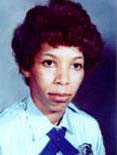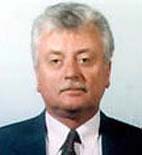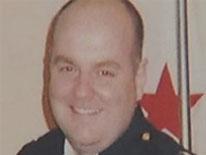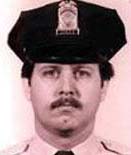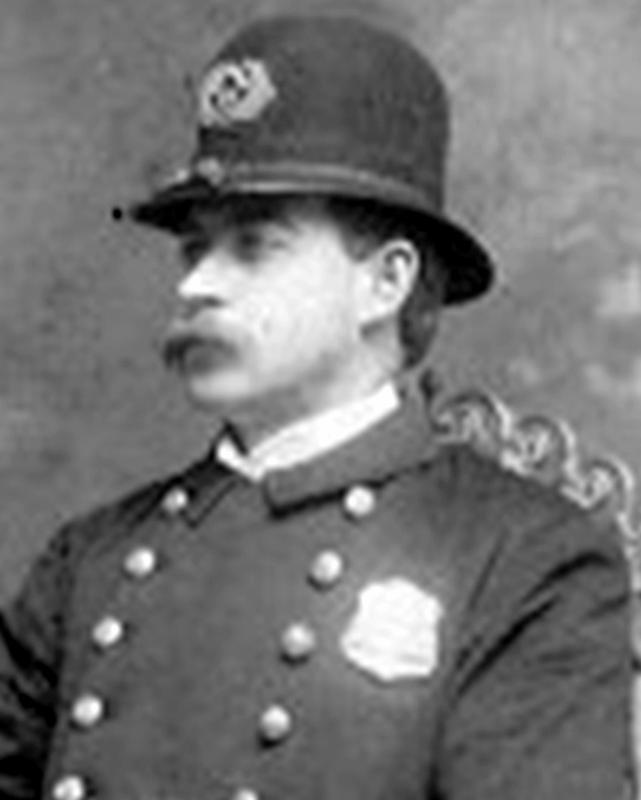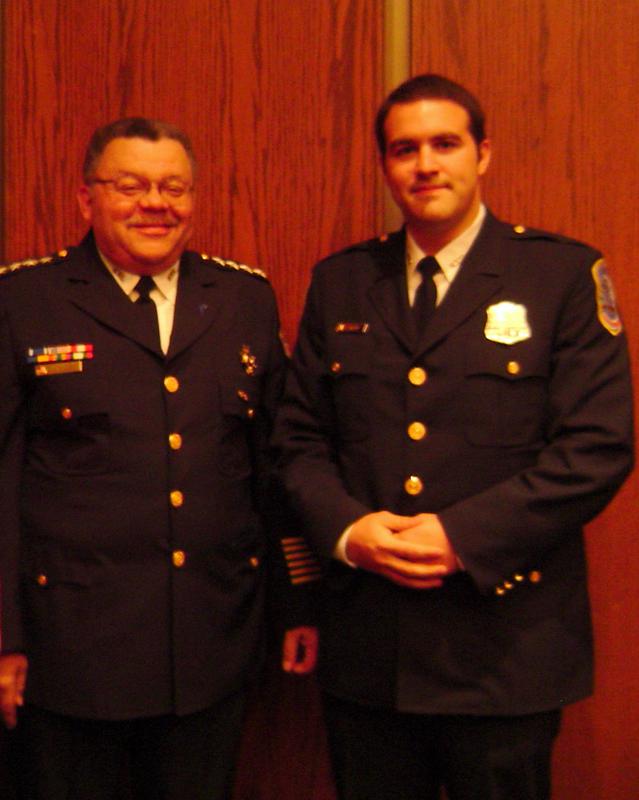FALLEN M.P.D. HEROES
FALLEN OFFICERS
OF THE
Washington D.C. Metropolitan Police
Profiles will be added as I am either provided with them or as I come across the information. Please feel free to submit articles photos or personal stories. Any newspaper articles, photographs or items of interest that you would like to send should be sent to: " Chuck Gallagher - P.O. Box 911 - Foxborough, MA. 02035 "
The format will change for each officer depending on the information I receive. Currently I have copied the information from the MPDC's web site but hope to customize these more as time goes on.
HENRY J. DALEY :
GAIL A. COBB :
(From the Official MPDC Department Web Site)
Officer Killed in the Line of Duty
Date of Death: November 22, 1994
Rank: Sergeant
Age: 51
Years of Service: 28
Marital Status: Married
Children: Two
Location of Death: 300 Indiana Avenue, NW (MPDC Headquarters)
Circumstance:
A homicide suspect, upset with the Metropolitan Police, entered Police Headquarters with an assault weapon. He then entered the Cold Case squad of the Homicide Branch. The suspect shot and killed Sergeant Daly and two FBI agents, Michael J. Miller and Martha Martinez. The suspect also wounded another FBI agent and a citizen, before committing suicide.
Seeking additional information on John
KEVIN WELSH :
GERALD W. BURKE JR.
(From the Official MPDC Department Web Site)
Officer Killed in the Line of Duty
Date of Death: March 23, 2006
Rank: Sergeant
Age: 39
Years of Service: 16
Location of Death: 2800 block of 11th St., NW
Circumstance
At approximately 5:08 pm on Thursday, March 23, 2006, off-duty 39-year-old Sergeant Gerard W. Burke Jr., a 16-year-veteran with the Metropolitan Police Department's Third District, was operating his private vehicle southbound on 11th Street, NW. While in the 2800 block of 11th Street, NW, Sergeant Burke was utilizing his cell phone to contact Police Communications and check on a suspected stolen Honda being operated in front of him by a young teenager.
It was at this time that Sergeant Burke suffered an apparent medical emergency, and his vehicle crashed into other cars before coming to a stop. Sergeant Burke was taken to the Washington Hospital Center's MedStar Unit and pronounced dead. The driver of one of the vehicles struck by Sergeant Burke's vehicle was also taken to the Washington Hospital Center and treated and released.
The autopsy conducted by the DC Office of the Chief Medical Examiner indicates that the initial cause of death was due to a ruptured aorta and not the traffic accident. Chief of Police Charles H. Ramsey has ruled Sergeant Burke's death to be in the performance of duty.
It was later determined that the Honda had been stolen that same day from the 3600 block of New Hampshire Avenue, NW. The vehicle was recovered at approximately 1:22 am, on Friday, March 24, in the 1300 block of Spring Road, NW.
Biography
Sergeant Gerard Burke was a 16-year veteran of the MPDC. Over the years, Sergeant Burke distinguished himself for heroism and excellence. He received the Bronze Star for administering CPR to fellow officer Brian Gibson, who was ambushed and shot in February 1997 at the corner of Georgia and Missouri Avenues, NW. Former Chief of Police Charles H. Ramsey said Sergeant’s Burke selfless efforts helped to keep Officer Gibson alive long enough for his family to visit him in the hospital before he died. Sergeant Burke also received the Achievement Medal in 2003, and the Police Service Area he led — PSA 302 — was named the PSA of the Year for ROC-Central in 2005. In addition to being respected by his fellow officers, Sergeant Burke was well known and loved in the Columbia Heights community where he both worked and lived.
(From the Official MPDC Department Web Site)
Officer Killed in the Line of Duty
Date of Death: August 4, 1986
Rank: Officer
Age: 34
Years of Service: Seven
Marital Status: Married
Children: Two
Location of Death: 11th Street Bridge, SE
Circumstance:
Officer Welsh and his partner, Officer O'Dell, answered a radio call for the rescue of a "jumper." The officers arrived on the scene and jumped into the river to rescue the female who had jumped from the bridge. Suddenly, Officer Welsh indicated that he needed help, but went under and drowned before he could be assisted. Officer Welsh's body was recovered four hours later.
The female jumper was a mental patient from St. Elizabeth's Hospital.
(From the Official MPDC Depaertment Web Site)
Officer Killed in the Line of Duty
Date of Death: September 20, 1974
Rank: Officer
Age: 24
Years of Service: One
Marital Status: Single
Children: One
Location of Death: 20th and L Street, NW
Circumstance:
Officer Cobb was walking a footbeat, when a citizen reported to her that a man with a gun just ran into the parking garage. The man, a robbery suspect, was running from other officers.
Officer Cobb confronted the man and made him place his hands on the wall. As Officer Cobb attempted to use her radio to call for back up, the suspect drew a handgun and shot her once, the bullet hit her arm and entered her heart.
Officer Cobb was the first female officer to be killed in the line of duty for the Metropolitan Police Department.
SEEKING additional information on Kevin....
Additional information wanted on Gerald !
Additional information wanted on Gail...
Officer Killed in the Line of Duty
Date of Death: December 29, 1871
Rank: Officer
Age: 38
Years of Service: Five
Marital Status: Married
Children: Three
Location of Death: 329 Maryland Avenue, SW
Circumstance:
Francis M. Doyle
Officer Francis M. Doyle was the first Metropolitan Police Officer killed in the line of duty. The Metropolitan Police Department was only ten years old at the time of Officer Doyle's murder. He was shot as he and several other officers attempted to force entry into a home on Maryland Avenue while conducting an investigation. Officers had gone to the home earlier in an attempt to recover a stolen watch and were held off by the suspect's wife. When the police officers returned they forced the door open but were immediately fired at by the woman. Officer Doyle was struck in the right chest and killed instantly.
The woman was charged with murdering Officer Doyle but acquitted of the charge at trial. It was ruled as an accidental shooting..
Officer Doyle served in the US Army and US Navy during the great Civil War. He had served with the Metropolitan Police Department for five years and was survived by his wife and three children.
More information wanted on Officer Doyle
Blacksheep Productions 2009
Please click the above tab to go to the Official MPDC web site for Officers of the MPDC Killed in the line of Duty. Below I am adding additional information that I have either been provided by friends and family or that I have discovered on line.
Hero's come to us in many different ways. Often when they are least expected, this is a different kind of hero. This story is about a young man new to the M.P.D.C. He was motivated and hopeful, but life decided it was time for him to move on. In doing so he saved others, allowing them to further life. Specifically connected to another family from within the M.P.D.C. This is the story provided to me by his father.
Fate Reveals Fallen Officer's Gift
D.C. Organ Donor and Ailing Woman Shared a Crucial Link
By Susan Levine
Washington Post Staff Writer
Tuesday, October 11, 2005; Page A01
For each of them that grueling, tragic, miracle-touched week, the intersection of life and death began with a single call.
5:20 p.m. Tuesday: In Massachusetts, the telephone rang minutes after Ken and Jeanne McBride got home from work. A D.C. police officer was on the line. Their elder son, an aspiring bike patrolman, had been taken to the hospital after falling ill on a training ride. His condition was unclear, the officer said; they should fly to Washington. The McBrides packed fast and caught the last shuttle out of Boston.
1 a.m. Thursday: An exhausted Annettor Murphy was asleep at her sister's house in Southern Maryland, just back from another hospital stay, another reprieve until her body again started failing. It was her sister who heard the phone and got the news; within seconds, she was upstairs, screaming ecstatically. They had to drive back to Washington, she told Murphy. A liver was finally there for her.
One family, deep in mourning. The other, veering between hope and fear. They were strangers to each other and likely to remain so, because the system that recovers and distributes human organs zealously guards the confidentiality of all involved. Most recipients learn little about the people who have given them a second chance at living.
This time would have been no different -- except for a third call.
7 a.m. Thursday: D.C. police Sgt. Kimberly Taylor picked up the phone at the 1st Police District station in Southwest Washington. For hours, she had held emotion in check while others around her grieved; James Craig McBride had been one of their own, a popular presence in 1D. But now, Taylor's cousin was on the line. Her aunt, he said, was back at Georgetown University Hospital and about to get a transplant. The liver was coming from a donor at Washington Hospital Center.
"What did you say?" Taylor demanded, instantly making the connection. She began shaking and ran into her commander's office.
"McBride . . . " she sobbed, barely able to get her words out. "McBride's saved my auntie's life."
By afternoon, she and the officer's parents would be embracing.
Annettor Murphy, 61, no longer remembers her first symptoms. They surfaced more than 11 years ago, landing her in hospital after hospital, with doctor after doctor unsure of what was wrong. By the time surgeon Lynt Johnson met her, she was critically ill, on a ventilator and suffering liver and kidney failure. Johnson expected her to die.
Murphy's medical problems, it turned out, stemmed from a rare syndrome that causes blood clots to form in the veins of the liver. Although she pulled through the first emergency, myriad complications followed, including her body's relentless, debilitating accumulation of fluid. So extreme was the buildup that every few weeks for the next decade, Murphy would go to a hospital to have as much as 3 1/2 gallons of fluid drained from her abdomen. She struggled on until pain and disability forced her to quit her job as a D.C. correctional officer. Her only salvation, Johnson believed, would be a transplant.
Murphy was put on the waiting list Feb. 11, 1999. She stayed on it 6 1/2 years -- nearly 600 days longer than the average wait for a liver in this country.
During those years, Craig McBride graduated from high school near Boston. He entered American University and received a degree in political science. He joined the D.C. police force -- bent on making a difference, on making the streets of his adopted city safer --and started law school at night. He got engaged. He was named 1D's rookie cop of the year.
The circumstances of his last days were widely reported after his death. On Aug. 8, the 25-year-old officer began the weeklong course, intent on adding bike skills to his beat in the crime-ridden Sursum Corda housing cooperative. The next morning, he tackled a 12-mile ride. Under warm, sunny skies, McBride overcompensated as he trained and unknowingly drank too much water. That over-hydration triggered a sodium imbalance in his bloodstream that in turn caused massive swelling of the brain.
In the early afternoon of Aug. 10, with his mother and father beside him and devastated colleagues crowding the hallway, the young officer was declared brain-dead at Washington Hospital Center. His parents never questioned his choice to be an organ donor.
"We said, in essence, 'Whatever can be used for good, you have our blessing,' " Ken McBride recalled.
What was used: corneas, kidneys and lungs, his pancreas and small intestine, his heart, skin, other tissue and, not least, his liver. More than 300 people across the Washington region were waiting that day for a new liver. About 1,700 needed a new kidney, with dozens more on the lists for other organs. "My wife and I didn't hesitate," McBride said.
Johnson was reached late that night. Although he saw a transplant as Murphy's sole hope, Georgetown's chief of transplant surgery was not hopeful. He expected her operation to be an extremely difficult procedure, perhaps one of the toughest of the hundreds he had done. Everything needed to be optimal for success. And his patient and her family had to understand: She still might die before it was over.
Johnson decided to proceed despite lingering misgivings. "Sometimes you get this feeling that fate just happens," he said. "This was one of those times."
He had no way of knowing how much fate would intervene.
Murphy was in surgery as her son and niece walked into the District hotel where the McBrides were staying. They all hugged and cried. Her family, Taylor said, would be forever grateful.
The McBrides had agreed to the contact through intermediaries. Taylor had been desperate to meet them before the couple returned to Massachusetts. "This was a heroic person," she told them, talking about their son. She talked, too, about her "Aunt Netta" and the pain she had long endured.
It all seemed "appropriate," Ken McBride thought. "Very natural." One good thing that could come out of a horrible situation. "Craig would have liked it," his father said.
During the next month, they reconnected several times.
Taylor drove the officer's parents to the 1st District station, took them in the roll-call room, showed them his locker. After the funeral, the McBrides stopped by the hospital to see Murphy. Her recovery remained tenuous -- she had almost died during the 12-hour surgery, her heart nearly stopping -- and she was not conscious. "We're members of the family," Ken McBride told a nurse in intensive care, because that seemed the most appropriate thing to say.
In late August, when a memorial service was held at Craig McBride's high school, Taylor was there in uniform to give a eulogy. She wanted everyone in his home town to know "how great he was, how great he was to my family. I could not sleep," she explained recently, "until it was done."
Murphy has only heard about those encounters, of course. She was not discharged from the hospital until Sept. 11, her sister driving her home on a warm Sunday evening. Midweek, strength slowly returning, she rested on her sofa and reflected on the strange twists of life that saved her own. She is a statuesque woman whose surgeon marvels at her steadfast humor and humanity. Murphy deflects praise. "I just prayed and kept the faith," she said.
As soon as she is able to travel, her niece will take her to Massachusetts to meet the McBrides. To say she wants to express her gratitude is an understatement. She already knows what she wants to tell them:
"Your son lives on.”
